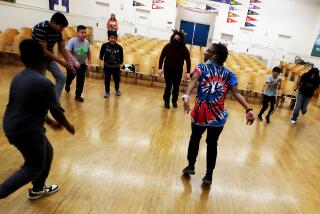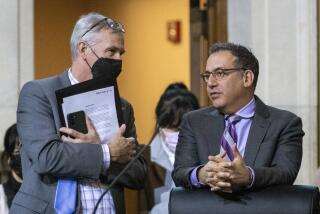Hahn’s Budget Avoids Major Spending Cuts
Improvement in the local economy combined with an increase in revenue from the Department of Water and Power has allowed Los Angeles to avoid significant budget cutbacks in the spending plan presented Friday by Mayor James K. Hahn.
Hahn’s budget team took advantage of the area’s robust real estate market to help close the budget gap, while also turning to the DWP for a bigger share of the municipal utility’s receipts.
As a result, a shortfall that many had predicted would be the largest in a decade instead shrank significantly, allowing the government to avoid layoffs and major service cutbacks.
The 2002-2003 budget, which the mayor unveiled Friday, contains small trims to the city bureaucracy while slightly increasing police, fire and other basic services.
The total city budget is $4.81 billion, down a fraction from last year, and for the most part maintains the status quo, including a citywide hiring freeze.
“The slowing economy and the effect of the [Sept. 11] attacks made this one of the most difficult budgets in years,” Hahn said during a morning news conference.
The City Council now begins its review of the proposed budget, which must be returned to the mayor for approval by June 1.
“I think the mayor’s budget did a good job of preserving the level of city services we funded last year,” said City Councilman Nick Pacheco, head of the Budget Committee. “I’m sure there’s a bunch of small issues that we’re going to have to deal with, but in terms of the big picture, I think all of our hard work this year with savings paid off.”
In January, city officials warned that Los Angeles could be facing a $250-million budget shortfall and predicted that all but basic public safety services could face cuts.
But in the last few months, the prognosis of next year’s revenues perked up considerably, powered by a strong local real estate market. Now, officials believe that the city’s revenues will grow by a modest 3% next year, and perhaps more.
“All the local, state and national economists are saying we’re well on our way to recovery,” said William Fujioka, the city’s administrative officer. “But we still need to proceed carefully.”
The mayor’s office persuaded the DWP to increase its contribution to the city coffers from 5% of power sales to 7%, an increase of about $46 million.
The change brings the DWP in line with other public utilities, many of which give a bigger share of their profits to local municipalities. The move still must be approved by the DWP Commission.
“Given our financial strength and position in the market, we’re in a good position to absorb the cost,” said Frank Salas, the DWP’s chief operating officer.
Hahn was also able to close the projected gap in the 2002-03 budget by pushing city departments to make $49 million in cuts in this fiscal year and instituting a hiring freeze for all employees except sworn police officers and firefighters, resulting in $15 million in savings.
Those moves allow the city to roll over $64.9 million into the reserve fund, just enough to meet the minimum standard of 2% of the general fund.
“I’m impressed with how the budget has been handled, in terms of the deficits that everybody anticipated,” said City Council President Alex Padilla, praising the steps taken this year to save money.
In the end, the mayor’s budget team had to make only $38 million in cuts to balance the budget he presented Friday, trimming programs that affect city employees rather than Los Angeles residents.
Sixty-nine positions throughout the city are being eliminated through attrition. In addition, city departments have smaller budgets for contractual services, printing and binding, travel, and City Council liaisons.
“There’s not going to be a lot of traveling by departments to conferences next year,” Hahn said. “So they’re going to have to have somebody else go and take notes for them.”
With fewer resources, all but emergency maintenance on city buildings will be postponed. New phones will not be installed. Bulk mailings will be limited.
Julie Butcher, head of one of the unions that represents city workers, said she was pleased with the budget document.
“It’s a very reasoned approach to getting through temporarily tough times and not cutting anything that affects services,” she said.
The Department of General Services, which assists the rest of the city bureaucracy, took one of the largest cuts, losing about $3million.
Jon Mukri, general manager of the department, said he will be working with other city officials to determine how to prioritize the limited resources for maintenance and upkeep.
Some departments received modest increases. The Los Angeles Police Department is to get $34million more than this fiscal year, enough to hire 360 officers and implement the second year of a federal consent decree mandating changes in the department.
Hahn has also proposed transferring 100 officers from administrative positions in community affairs, the DARE program and the ombudsman’s office back to patrol.
Because attrition is expected to continue, the hiring and transfers will only slightly raise the number of police officers on the street. The mayor said that if recruitment and hiring increase, he will try to find money to hire more officers.
The Fire Department is to receive an increase of $19 million, money that will replace obsolete equipment and hire 24 more paramedics and 48 more firefighters. The mayor has also proposed establishing a new hazardous-materials squad in the harbor.
City Councilman Jack Weiss, who has been lobbying for more spending to defend the city against terrorism, said he was pleased with the new squad.
“It’s very good to see the mayor has taken the threat seriously and responded,” said Weiss, who added that he will try to find money to pay for additional measures during the budget process.
The mayor’s budget also includes more money for new parks, neighborhood councils and neighborhood prosecutors, who work with the LAPD and community groups to tackle crime.
If approved by the council, about 260 miles of streets will be resurfaced and 78 miles of sidewalks will be repaired--the same amount as last year. More than 123,000 trees will be trimmed.
“It is frustrating in my first year in office, my first budget, I’m actually looking at spending less money in the city than more,” Hahn said. “But we looked for ways to make cuts really not visible to the public.”
More to Read
Sign up for Essential California
The most important California stories and recommendations in your inbox every morning.
You may occasionally receive promotional content from the Los Angeles Times.










